Event Report | The 2015 Algerian Paper of the Year Awards
Using silver nanoparticles to improve antibacterial activity, developing algorithms for enhancing multiview video coding, exploring the chemistry of sulfamides, characterising the rainfall in Birzgane in the middle paleolithic period, and investigating alzheimer disease in Algerian patients. These are the themes of the research papers that won the 2015 Algerian Paper of the Year Awards, an annual event organised by the Algerian Network for Academics, Scientists & Researchers (anasr.org) to celebrate and promote the best of scientific output produced in Algerian universities and research centres.
Running in its third edition, anasr.org’s awards initiative continued to be distinguished by the fact that it is independently organised and fully sponsored by the community of Algerian academics, scientists and researchers across the globe. As a principle, we at anasr.org are especially keen on ensuring that these awards are, above all, a renewed opportunity to build and strengthen ties between the Algerian scientific community inside and outside of Algeria.
The following report describes the details of this year’s edition of the awards, including the organisation and selection processes, the announcements event, and the ultimate winners of this competition.
The Selection Process
This year’s awards followed the same process as the previous two editions. In the spirit of openness and participation, we start the event off each year by an open call for members of the community to join our Awards Committee. The committee is open to anyone with relevant expertise and who is willing to volunteer their time and efforts. Its main role is to oversee the running of the awards from start to finish. As in previous editions, this involves managing a three-stage selection process, a typical structure that seeks transparency and rigour through nomination, shortlisting, and peer-review.
Nominations
We opened the call for nominations to the community on January 1st 2015. We accepted nominations in the usual five categories; Biological Sciences; Chemical Sciences; Computer Science & Engineering; Medicine, Pharmacy & Veterinary Sciences; and Physical Sciences & Mathematics. The criteria for nominating papers was also kept the same as in the previous editions. Namely, that 1) the nominated papers must have been published either online or in print between the 1st of January and 31st of December of the previous year, 2) the majority of the work must have been carried out at an Algerian university of research centre, 3) the papers report on original research rather than reviews or book chapters. This year, we also instructed participants to limit their submissions to one paper per nomination in order to improve the management of the nominations stage.
In addition to advertising the call for nominations on various social media outlets, the awards committee also actively invited authors to nominate their papers through email correspondence. Each year, we do this by searching through online repositories and journal databases as well as conference proceedings (e.g. ISI Web of Knowledge, ACM Digital Library, IEEE Digital Library, SpringerLink, PubMed, etc.) using keywords such as “Algeria”, “Algerian” and “Algérie”, and contacting corresponding authors to invite them to nominate their papers. This year, we have sent around 600 email invitations.
As a result of this process, we received a total of 331 papers (compared to 160 and 253 nominations in the first and second editions respectively). We received 67 papers in Biological Science, 66 in Chemical Sciences, 81 in Computer Science & Engineering, 40 in Medicine, Pharmacy & Veterinary Sciences, and 77 in Physical sciences & Mathematics. Besides marking an overall increase of about 48% in the number of nominations since the first edition of the awards – which testifies to the growing popularity of this initiative amongst our colleagues in Algeria – we were particularly pleased that this year’s nominations were also fairly equally distributed across all five categories of nominations.

Number of papers nominated to the Algerian Paper of the Year Awards 2013-2015 (click on the image to enlarge)
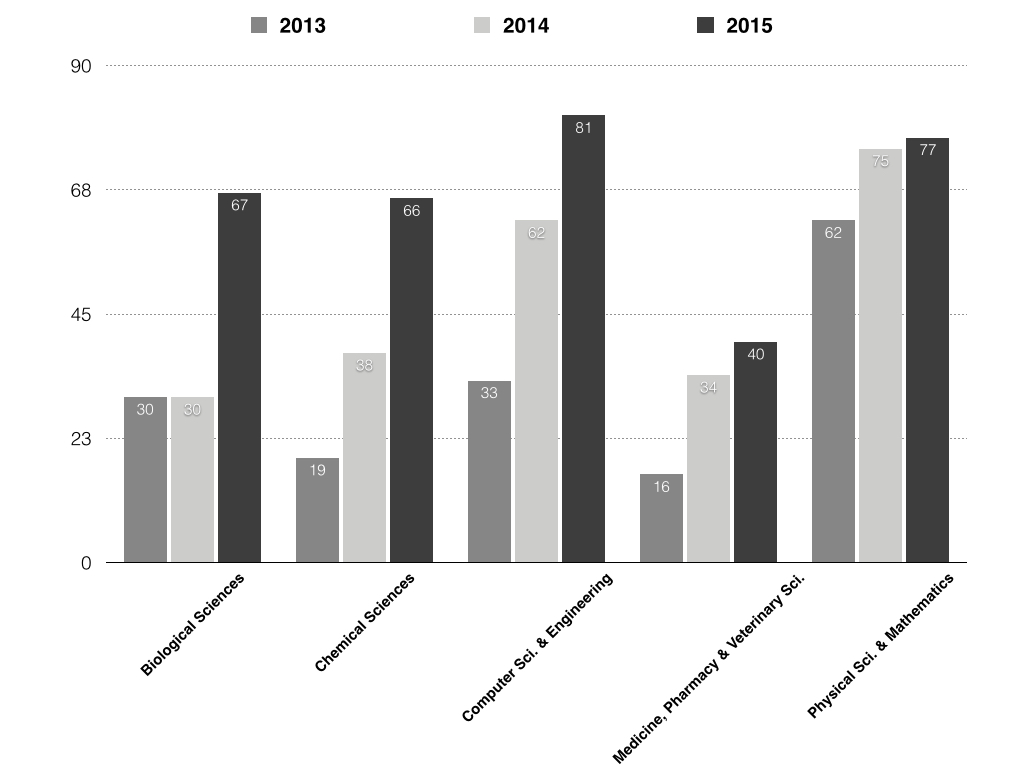
Number of papers nominated across the five categories of the Algerian Paper of the Year Awards 2013-2015 (click on the image to enlarge)
Shortlisting
The next stage in the selection process is the creation of shortlists in each category of nomination. To do this, we again sent an open call to the community to volunteer their time and efforts to help us make sure that the nominated papers match the nomination criteria highlighted above, as well as to select the top papers that constituted the most promising papers to win the awards. As was the case in previous editions, we did not put restrictions on how members of the shortlisting panel should go about choosing who they thought were the top papers. However, we asked them to take into consideration the following general questions: 1) is the work novel? 2) does it address significant aspects in its field of specialism? 3) are the experiments and analyses rigorous and well presented?
At this stage, we try to ensure that the expertise of the members of the shortlisting panels span a wide range of fields in each category of nomination. This is particularly important for papers nominated under the Computer Science & Engineering and the Physical Sciences & Mathematics categories, since these tend to cover a wide range of topics. Each member of the shortlisting panel provided us with a ranking of the top papers in each category of nomination. We then corroborated scores from a total of 22 shortlists to determine the top papers in each category of nomination.
Peer-reviewing
The final stage of the selection is the peer-review. The aim is to send each shortlisted paper to at least three international reviewers within corresponding fields of expertise. At this point, our aim is to engage with high calibre researchers from around the around who scrutinise the papers and score them on the following criteria: 1) novelty of the work, 2) quality of the experiments, statistics and/or other analyses, 3) significance of the findings, 4) presentation of the work in terms of structure and language standards, and 5) potential impact. Papers that score the highest are selected as the winners of the 2015 Algerian Paper of the Year Awards in their corresponding nomination category.
Following the above process, we collected final scores from a total of 26 international academics, scientists and researchers. Their scores were verified by two independent individuals and were conclusive across all categories of nominations.
Winners Announcements Event
The winners of the 2015 Algerian Paper of the Year Awards were announced in an event that was held on the 2nd of May 2015 at Queen Mary University of London in the UK. The event was also live streamed over the internet. In line with our objective to build bridges between academics, scientists and researcher inside and outside of Algeria, the event this year included contributions from prominent Algerian researchers and scientists from around the world. We also contacted the winners live to congratulate them on their award winning papers.
Prof Moahemd Saad, professor of Innovation and Technology Management at the Bristol Business School, the University of the West of England, gave a keynote talk entitled “The changing role of universities and their links with socioeconomic development: The case of Algeria”. The talk described the extent of the contribution of the Algerian higher education sector within the national system of innovation and the degree of relationships that exist between industry and universities in Algeria. Prof Saad also described the different types of linkages that exist between industry and universities in Algeria and the main mechanisms used to establish these links. He also addressed the questions of motives to universities in establishing links with the industry and the potential barriers that can impede such links.
Here is Prof Saad’s keynote talk:
This year, we were also delighted to have a number of special guests who announced and presented commentaries on the winning papers. Dr Abbad Abdennour who leads the Biosensors and Bio-nanotechnology lab at the University of Minnesota announced the winners in Biological Sciences, Dr Yassine Amrani from the Department of Infection, Immunity and Inflammation at the University of Leicester announced the winners in Medicine, Pharmacy & Veterinary Sciences, and Prof Nidhal Guessoum, professor of physics at the American University of Sharjah announced the winners in Physical Sciences & Mathematics.
Additionally, Dr Youcef Mehellou, a lecturer in Medical Chemistry at the University of Birmingham, and who also co-chairs the Algerian Paper of the Year Awards initiative, announced the winners in Chemical Sciences, and Dr Ghita Kouadri-Mostefaoui from the Department of Computer Science at University College London, who was also a volunteer member on this year’s awards committee, announced the winners in Computer Science & Engineering.
Below is the list of winners and honourable mentions in each category of nomination:
Biological Sciences
Winning paper: “Silver nanoparticles in combination with acetic acid and zinc oxide quantum dots for antibacterial activities improvement—A comparative study”
Authors: Sofiane Sediraa, Ahmed Abdelhakim Ayachi, Sihem Lakehal, Merouane Fateh, Slimane Achour
Authors’ affiliations: Ceramic Laboratory, University of Constantine1, Constantine, Algeria, Microbiological Laboratory Engineering and Application, University of Constantine1, Constantine, Algeria
Dr Abbas Abdennour’s commentary on the winning paper:
Here is the interview with Dr Sofiane Sedira
Honourable Mentions for Biological Sciences: In no particular order:
- “Purification, characterization and Antibacterial Activity of L-amino Acid Oxidase from Cerastes cerastes”, Ziad-Meziane Hanane-Fadila and Laraba-Djebari Fatima. USTHB, laboratory of Cellular and Molecular Biology, Faculty of Biological Sciences, BP 32, El-Alia, Bab Ezzouar, 16111 Algeris, Algeria; Journal of biochemical molecular toxicology
- “Quercetin mitigates Adriamycin-induced anxiety-and depression-like behaviors, immune dysfunction, and brain oxidative stress in rats”. Sameha Merzoug, Mohamed Lamine Toumi, Abdelkrim Tahraoui Laboratoire de Neuro-endocrinologie Applique, Department de biologie, University Badji Mokhtar, Annaba; Journal: Naunyn-Schmiedeberg’s Arch Pharmacol
- “Immunomodulatory and protective properties of tacrolimus in experimental scorpion envenomation”. M Kabrine and F Laraba-Djebari. USTHB, Faculty of Biological Sciences, Laboratory of Cellular and Molecular Biology, Algiers; International Journal of Immunopathology and Pharmacology
- “New complexes of manganese (II), nickel (II) and copper (II) with derived benzoxazole ligands: Synthesis, charachterisation, DFT, antimicrobial activity, acute and subacute toxicity”. Afaf Bouchoucha, Achour Terbouche, Assia Bourouina, Safia Djebbar USTHB, Hydrometallurgy and Molecular Inorganic Chemistry Laboratory, Faculty of Chemistry, Algiers; Journal: Inorganic Chimica Acta 418 (2014) 187-197
- “Ion exchange membrane textile bioreactor as a new alternative for drinking water denitrification“. Dalila Bedrous, Djamal-Eddine Akretche, Ahmed Abderahmani, Sakina Bedrous, Rima Meknaci Material Physics Laboratory, Physcis Faculty, USTHB, Algiers. Journal: Applied Environmental Biotechnology (2014) 98:5227-5239
Chemical Sciences
Winning paper:”Synthesis, Characterization and Antibacterial Activity of Cyclic Sulfamide Linked to Tetrathiafulvalene (TTF)”
Authors: Tahar Abbaz, Amel Bendjeddou, Abdelkrim Gouasmia, Djamel Bouchouk, Chahinez Boualleg, Nouha Kaouachi, Nicolas Inguimbert and Didier Villemin
Authors’ affiliations: Laboratory of Organic Materials and Heterochemistry, University of Tebessa, Constantine Road, Tebessa, 12000, Algeria; Laboratory of Aquatic and Terrestrial Ecosystems, Organic and Bioorganic Chemistry Group, University of Mohammed Cherif Mesaadia, Souk Ahras, 41000, Algeria; Laboratory of biomolecular and environmental chemistry (LCBE) EA 4215, University of Perpignan Via Domitia, 52 Avenue P. Alduy. F-66860 Perpignan, France; Laboratory of Molecular and Thio-Organic Chemistry, UMR CNRS 6507, INC3M, FR 3038, Labex EMC3, ENSICAEN & University of Caen, 14050 Caen, France
Dr Youcef Mehellou commentary’s on the winning paper:
In no particular order:
- “Comparison of [Nitric Oxide] NO2 removal using date pits activated carbon and modified commercialized activated carbon via different preparation methods: Effect of porosity and surface chemistry”. Meriem Belhachemi, Mejdi Jeguirim, Lionel Limousy, Fatima Addoun Laboratoire de Fiabilité des matériaux et des structures en région sahariennes, Université de Béchar, B.P. 417, 08000 Béchar, Algeria Institut de Science des Matériaux de Mulhouse, UMR 7361 CNRS, 15, rue Jean Starcky, 68057 Mulhouse, France Laboratoire d’étude physico-chimique des matériaux et application à l’environnement, Faculté de Chimie, USTHB, B.P. 32, El Alia, 16111 Bab Ezzouar, Alger, Algeria. Journal: Chemical Engineering Journal 253 (2014) 121-129
- “Corrosion mechanism of [aliminium] Al, Al–Zn [zinc] and Al–Zn–Sn [Tin] alloys in 3% [Sodium Cloride] NaCl solution”. S. Khireche, D. Boughrara, A. Kadri, L. Hamadou, N. Benbrahim Laboratoire de Physique et Chimie des Matériaux (LPCM), Université Mouloud Mammeri de Tizi-Ouzou, BP 17 RP, 15000 Tizi-Ouzou, Algeria. Journal: Corrosion Science 87 (2014) 504–516
- “Synthesis and Ring Transformation of Oxygen and Nitrogen Spiro Bisheterocycles”. Oualid Talhi, Diana C. G. A. Pinto, Filipe A. Almeida Paz, MaamarHamdi, Artur M. S. Silva Centre de Recherche Scientifique et Technique en Analyses Physico-Chimiques, USTHB, University of Aveiro Portugal. Journal: Synlett 2015, 26, 167–172
Computer Science & Engineering
Winning paper: “Feature-Based Color Correction of Multiview Video for Coding and Rendering Enhancement”
Authors: Sid Ahmed Fezza, Mohamed-Chaker Larabi, and Kamel Mohamed Faraoun;
Authors’ affiliations: Department of Computer Science, Djillali Liabes University of Sidi Bel Abbes, Sidi Bel Abbes; XLIM Laboratory, SIC Department, University of Poitiers, Poitiers
Dr Ghita Kouadri-Mostefaoui’s commentary on the winning paper:
Here is the interview with Dr Sid Ahmed Fezza
Honourable Mentions for Computer Science & Engineering:In no particular order:
- “An invariant observer for a chemostat model”. Ibtissem Didi, Hacen Dib, Brahim Cherki; Department of Electrical Engineering and Electronics, Tlemcen University, Algeria Department of Mathematics, Tlemcen University, Algeria. Journal: Automatica 50(2014) 2321-2326
- “Approach for the modelling of hybrid photovoltaic– thermal solar collector”. Abdelkrim Khelifa, Khaled Touafek, Hocine Ben Moussa Centre de Développement des Energies Renouvelables, CDER, Unité de Recherche Appliquée en Energies Renouvelables, URAER, 47133 Ghardaïa, Algeria . Département de Mécanique, Université El-Hadj-Lakhdar, Batna, Algeria Journal: IET Renewable Power Generation, P1-11
- “Multi-ROI Association and Tracking With Belief Functions: Application to Traffic Sign Recognition”. Mohammed Boumediene, Jean-Philippe Lauffenburger, Jérémie Daniel, Christophe Cudel, and Abdelaziz Ouamri Laboratoire Signaux et Images, Université des Sciences et de la Technologie d’Oran Mohamed Boudiaf, Oran 31000, Algeria the Laboratoire Mod- élisation Intelligence Processus et Systèmes (EA 2332), Université de Haute Alsace, Mulhouse 68093, France. Journal: IEEE Transactions on intelligent transportation systems 15 (2014) 2470-2479
- “Optimal power flow using the league championship algorithm: A case study of the Algerian power system” H.R.E.H. Bouchekara , M.A. Abido , A.E. Chaib , R. Mehasni Constantine Electrical Engineering Laboratory, LEC, Department of Electrical Engineering, University of Constantine 1, 25000 Constantine, Algeria Electrical Engineering Department, King Fahd University of Petroleum and Minerals, Dhahran 31261, Saudi Arabia. Journal: Energy Conversion and Management 87 (2014) 58–70
Medicine, Pharmacy & Veterinary Sciences
Winning paper: “IFN-y and TNF-a Are Involved During Alzheimer Disease Progression and Correlate with Nitric Oxide Production: A Study in Algerian Patients”
Authors: Mourad Belkhelfa, Hayet Rafa, Oussama Medjeber, Amina Arroul-Lammali, Nassima Behairi, Myriam Abada-Bendib, Mohamed Makrelouf, Soreya Belarbi, Ahmed Nacer Masmoudi, Meriem Tazir, and Chafia Touil-Boukoffa
Authors’ affiliation: Laboratory of Cellular and Molecular Biology, Faculty of Biological Science, USTHB, Algiers, Algeria. Department of Neurology, Mohamed Lamine Debaghine Hospital, Algiers, Algeria. Laboratory of Biochemistry and Molecular Biology, Mohamed Lamine Debaghine Hospital, Algiers, Algeria. Department of Neurology, Mustapha Pacha Hospital, Algiers, Algeria
Dr Yassine Amrani’s commentary on the winning paper:
In no particular order:
- “Sodium arsenite induces apoptosis and EpsteineBarr virus reactivation in lymphoblastoid cells”, Abderezak Zebboudj, Mohamed Ali Maroui, Jacques Dutrieux, Chafia Touil-Boukoffa, Mehdi Bourouba, Mounira K. Chelbi-Alix, Sebastien Nisole LBCM, FSB, Universit_e des Sciences et de la Technologie Houari Boumediene (USTHB), BP 32, El Alia, Bab Ezzouar, 16111 Algiers, Algeria INSERM UMR-S 1124, Universit_e Paris Descartes, 45 rue des Saints-P_eres, 75006 Paris, France. Journal: Biochimie 107 (2014) 247e256
- “TP53 [Arginine] Arg 72 Pro and MDM2 SNP309 Polymosphisms and colorectal cancer risk: A west Algerian Population Study”. Rym Abderrahmane, Lotfi Louhibi, Fatima Zohra Moghtit, Amina Boubekeur, Khedidja Benseddik, Abdellah Boudjema, Fouzia Benrrahal, Meriem Aberkane, Mostefa Fodil, Nadhira Saidi-Mehtar Laboratoire de Génétique Moléculaire et Cellulaire, Département de Génétique Moléculaire Appliquée, Faculté des sciences de la nature et de la vie, Université des Sciences et de la Technologie d’Oran- Mohamed BOUDIAF-USTOMB, BP 1505 El M’naouer, 31000 Oran, Algeria Centre de Recherche en Cancerologie de Marseille, Marseille, Centre Hospitalier d’Oran, 76, Bd Dr Benzerdjeb – Plateau, Oran, Département de Pharmacie, Faculté de Médecine, Université Pathology and oncology Research d’Oran, BP 1524 El M’naouer, 31000 Oran, Algeria
- “Antimicrobial effects of three essential oils on multidrug resistant bacteria responsible for urinary infections”. Fatima Zenati, Fethi Benbelaid, Abdelmounaim Khadir, Chafika Bellahsene, Mourad Bendahou Laboratory of Applied Microbiology in Food, Biomedical and Environment (LAMAABE), Aboubekr Belkaïd University, PO Box 119, 13000 Tlemcen, Algeria. Journal of Applied Pharmaceutical Science Vol. 4 (11), pp. 015-018, November, 2014
- “Oxidative stress and maternal obesity: Feto-placental unit interaction” N. Malti, H. Merzouk, S.A. Merzouk, B. Loukidi, N. Karaouzene, A. Malti, M. Narce Placenta 35 (2014) 411e416 Laboratory of Physiology, Physiopathology and Biochemistry of Nutrition, Department of Biology, Faculty of Natural and Life Sciences, Earth and Universe, University ABOU-BEKR BELKAÏD, Tlemcen 13000, Algeria Department of Technical Sciences, Faculty of Engineering, University ABOU-BEKR BELKAÏD, Tlemcen 13000, Algeria Gynecology and Obstetrics Department, Mother e Infant Hospital Center, University of Tlemcen, 13000, Algeria INSERM UMR 866, ‘Lipids Nutrition Cancer’, University of Burgundy, Faculty of Life, Earth and Environment Sciences, Dijon 21000, France
Physical Sciences & Mathematics
Winning paper: “The Middle Palaeolithic site of Birzgane (Tebessa, Algeria): Rock magnetic property characterisation and past rainfall reconstruction”
Authors: Abderrezak Djerrab, Simo Spassov, Nabil Defaflia, Jozef Hus, Salah Abdessadok, Muriel Ruault-Djerrab, Nadia Bahra, Souad Ech-Chakrouni
Author’s affiliations: University of Guelma, Département d’Histoire et d’Archéologie, Guelma, Algeria Laboratoire de recherche: Environnement Sédimentaire, Ressources Minérales et Hydriques de l’Algérie Orientale, University of Tebessa, Algeria Section du Magnétisme Environnemental, Centre de Physique du Globe de l’Institut Royal Météorologique de Belgique, B-5670 Dourbes (Viroinval), Belgium Département de Préhistoire, Muséum National d’Histoire Naturelle, Paris, France University of Constantine, Département d’Histoire et d’Archéologie, Algeria
Prof Nidhal Guessoum’s commentary on the winning paper:
Here is the interview with Dr Abderrezak Djerrab
Honourable Mentions for Physical Sciences & Mathematics:In no particular order:
- “Enhancement of h → γ γ via spin-0 and spin-1/2 charged unparticle loops” Idir Aliane, Noureddine Mebarki, Yazid Delenda Département des Sciences de la Matière, Faculté des Sciences, Université Hadj Lakhdar, Batna, Algeria Laboratoire de Physique Mathématique et Subatomique, Université Constantine 1, Algeria. Journal: Physics Letters B
- Electromagnetic Scattering From 3D Layered Structures With Randomly Rough Interfaces: Analysis With the Small Perturbation Method and the Small Slope Approximation Saddek Afifi, Richard Dusséaux, and Abla Berrouk Laboratoire de Physique des Lasers, de Spectroscopie Optique et d’Optoélectronique (LAPLASO), Badji Mokhtar-Annaba University Université de Versailles Saint-Quentin en Yvelines. Journal: IEEE TRANSACTIONS ON ANTENNAS AND PROPAGATION
- “A (varying power)-law modified gravity” Fayçal Hammad Université A. Mira, Route Targa Ouzemmour, 06000 Bejaia. Journal: PHYSICAL REVIEW D
- “Seismic imaging of the eastern Algerian margin off Jijel: integrating wide-angle seismic modelling and multichannel seismic pre-stack depth migration” A. Mihoubi, P. Schnu ̈rle, Z. Benaissa, M. Badsi, R. Bracene, H. Djelit,L. Geli, F. Sage, A. Agoudjil and F. Klingelhoefer2 Algerian National Oil Company, Sonatrach/Exploration Institut franc ̧ais de Recherche pour l’Exploitation de la Mer, France Universite ́ des Sciences et de la Technologie Houari Boumediene USTHB, Faculte ́ des Sciences de la Terre, Algeria Centre de Recherche en Astronomie, Astrophysique et Géophysique CRAAG, Algeria Univ. Pierre et Marie Curie, Univ. Nice Sophia Antipolis, IRD, observatoire de la Coˆte d’Azur, CNRS, Ge ́oazur, UMR F-7329, France. Journal: Geophysical Journal International
Funding & Acknowledgements
anasr.org is an independent initiative, developed and maintained on a voluntary basis without external funding by a dedicated and growing team of Algerian scientists and professionals. As a community-led initiative, we at anasr.org strive to seek funding only from the community that we aim to serve, in line with our core mission and principles. As was the case with the previous two editions, we thus turned to the community to raise the funds needed to sponsor the 2015 Algerian Paper of the Year Awards. The crowd-fundraising process was vastly successful and the community came together, once again, beautifully and generously to help us cover the full costs of the awards, which included producing the award plaques and certificates, their shipment to Algeria as well as the costs of hosting the winners’ announcement event in London.
We would like to thank everyone who shares our believes and aspirations for the Algerian academic and scientific community and who supported this initiative so generously with their donations.
anasr.org and its awards committee would like to thank all participants who nominated their papers for The 2015 Algerian Paper of the Year Awards, all those who participated in the shortlisting and reviewing panels, the keynote speaker at the winners announcement ceremony, Prof Mohammed Saad, and our special guests who provided insightful commentaries on the winning papers; Dr. Abdennour Abbas (USA), Dr Yassine Amrani (UK) and Prof Nidhal Guessoum (UAE).
The anasr.org team would also like to thank our fellow colleagues who volunteered their time and effort to be part of this year’s awards committee: Dr Abderrahmen Zoghbi (USA), Dr. Ghita Kouadri-Mostefaoui (UK), and Dr Abdelmalik Bachir (DZ). Many thanks for the wider community of Algerian academics, scientists and researchers and students, and everyone who supported this initiative in so many ways. And of course many congratulations to all the winners of this year’s edition of the awards.
We are indeed already looking forward to the next edition of the Algerian Paper of the Year Awards to engage with our community and discover, share and inspire the best of Algerian intellect.
Committee for the 2015 edition of the Awards
Dr. Oussama Metatla, Queen Mary University of London, UK (anasr.org)
Dr. Youcef Mehellou, University of Birmingham, UK (anasr.org)
Dr. Abdelmalik Bachir, University of Biskra, Algeria
Dr. Ghita Kouadri-Mostefaoui, University College London, UK
Dr. Abdrehen Zoghbi, University of Michigan, USA
Contributors
Prof Mohamed Saad, University of the West of England
Dr Abbas Abdennour, University of Minesota
Dr Yassine Amrani, University of Leicester
Prof Nidhal Guessoum, the American University of Sharjah
anasr.org core team
Mr Sofian Otmani
Dr Abderrezak Soltani
Dr Romaissa Asme Boussahel
Dr Youcef Mehellou
Dr Oussama Metatla
2 Comments so far
Event Report | The 2016 Algerian Paper of the Year Awards | Inspire MagazinePosted on 10:23 am - Jun 4, 2016
[…] 172 research articles have been nominated for this year’s award in five categories. The submissions went through a rigorous and a competitive selection process. After an initial short-listing of the top five articles in each category, the articles were reviewed by international experts. The award committee then selected the top articles based on the recommendations of the reviewers. The selection process and criteria were kept the same as in previous editions of the awards. […]
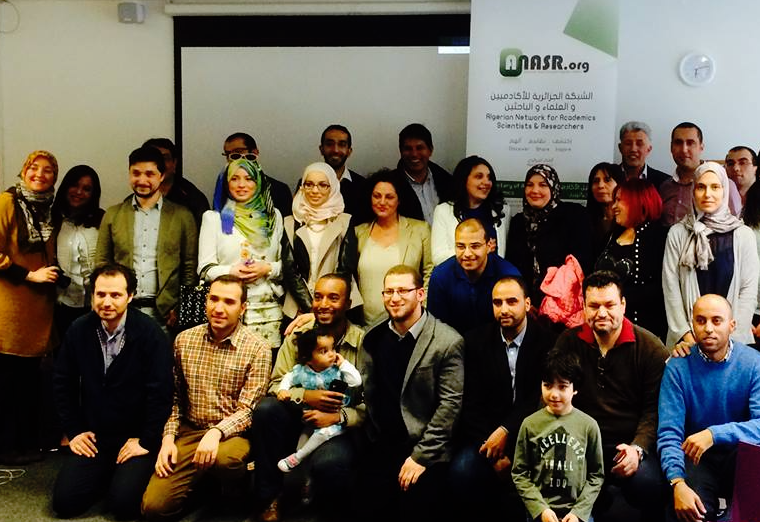
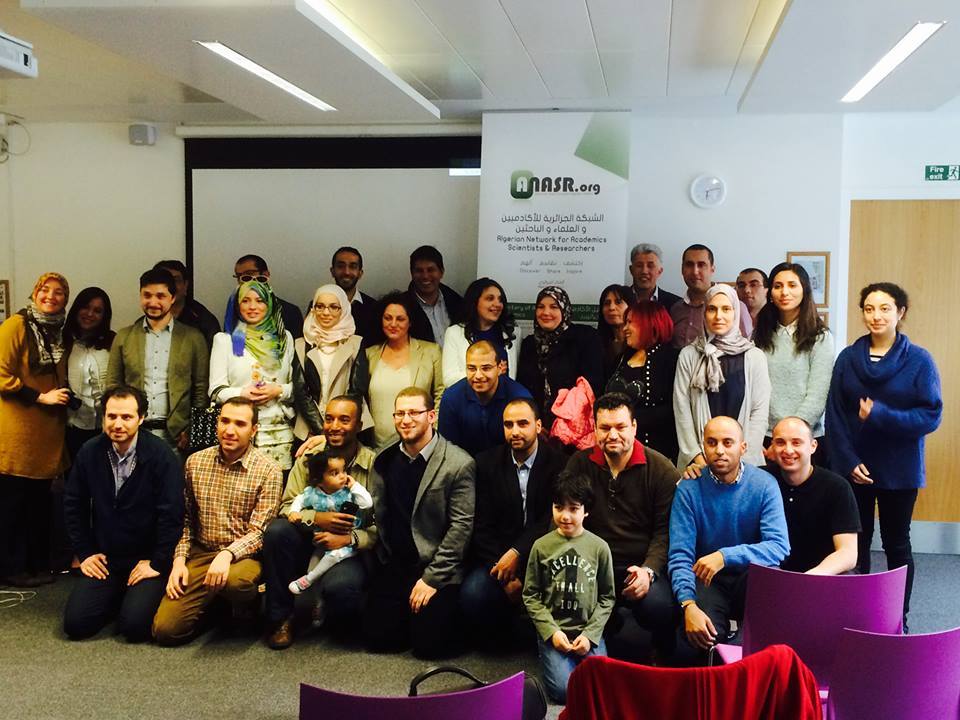
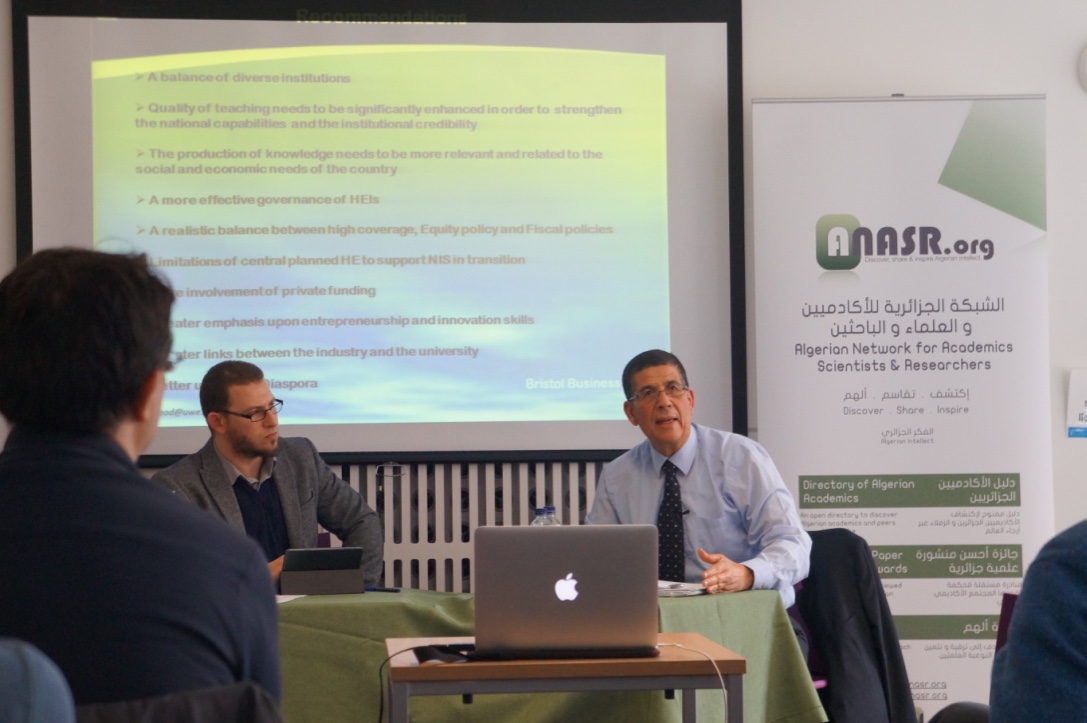
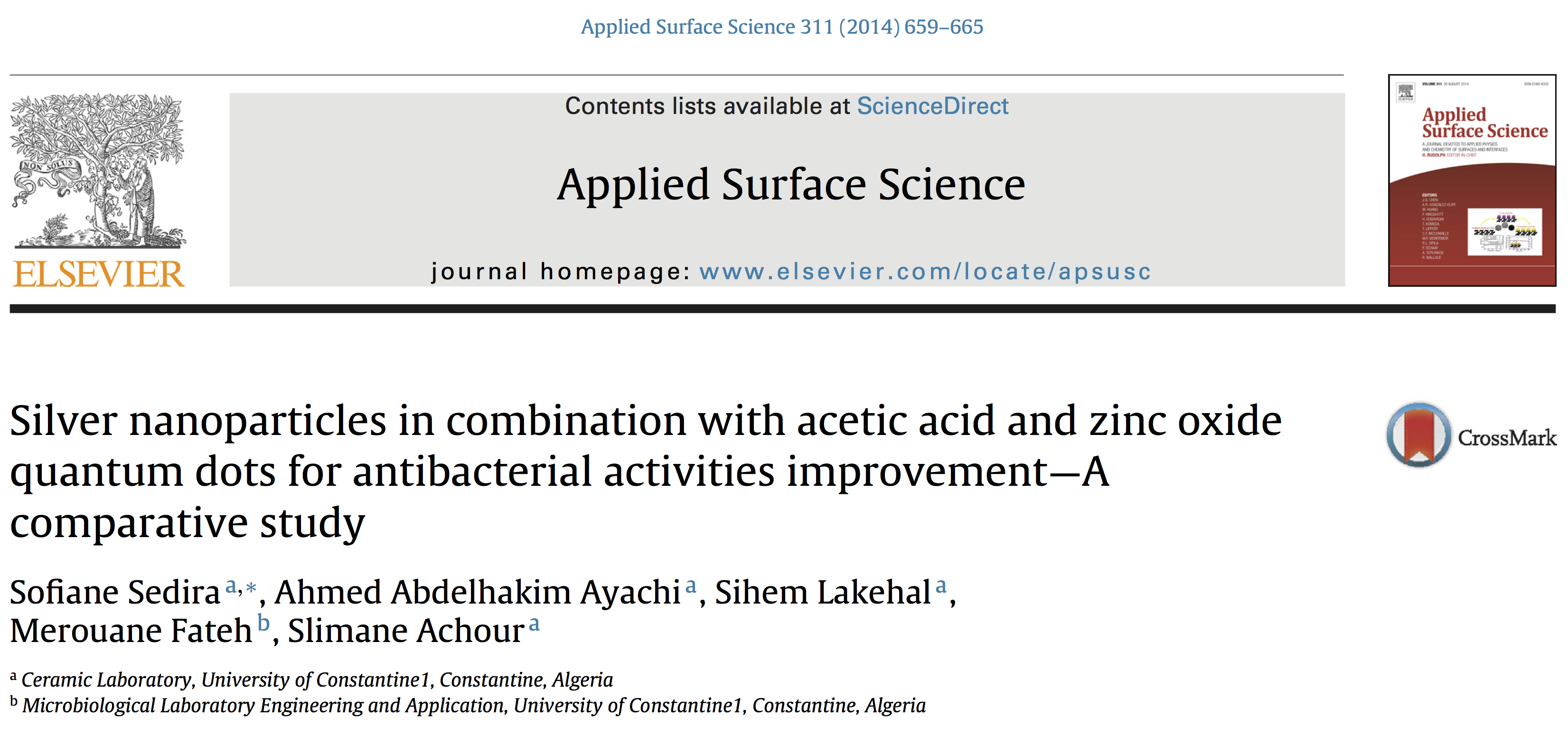
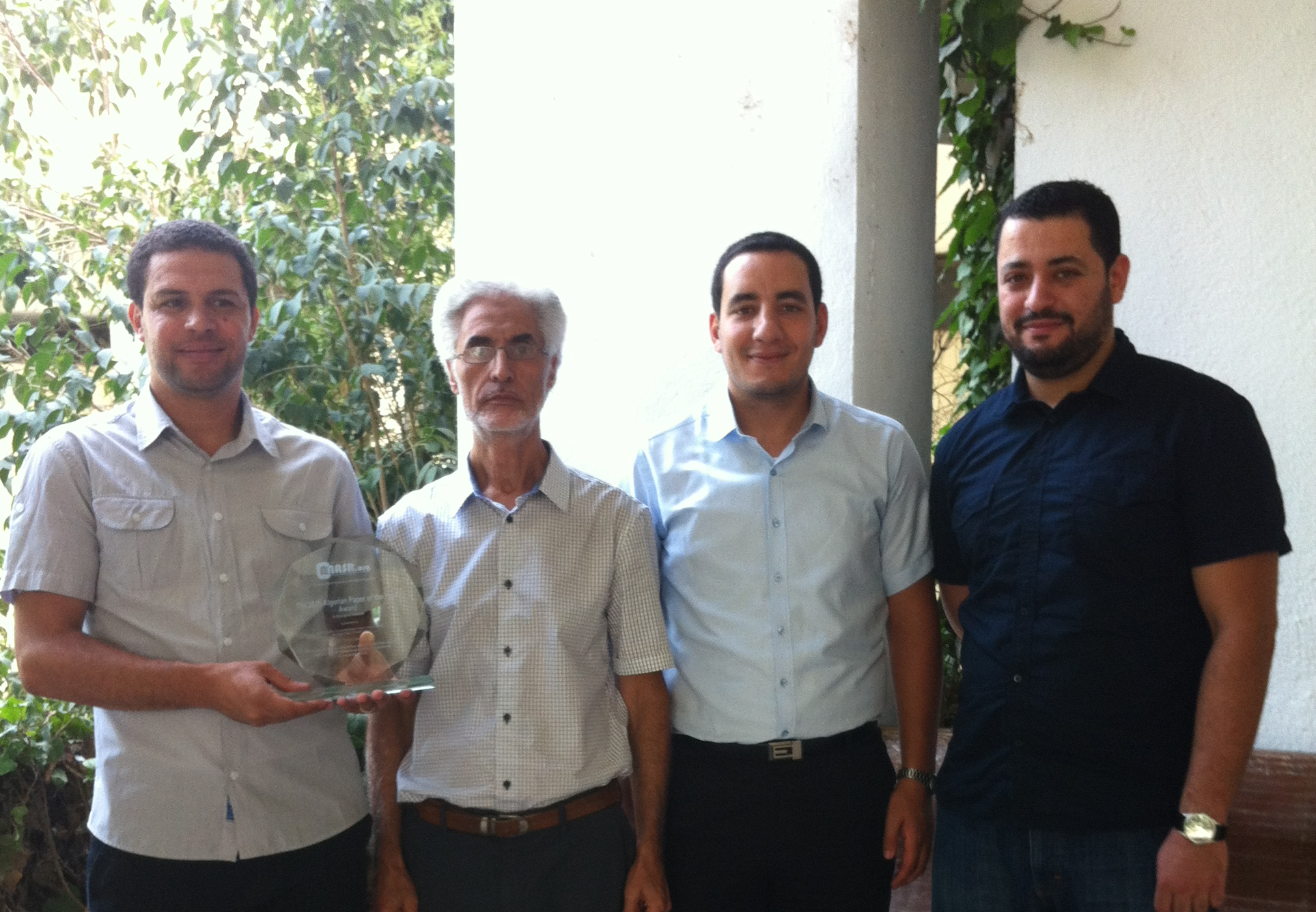
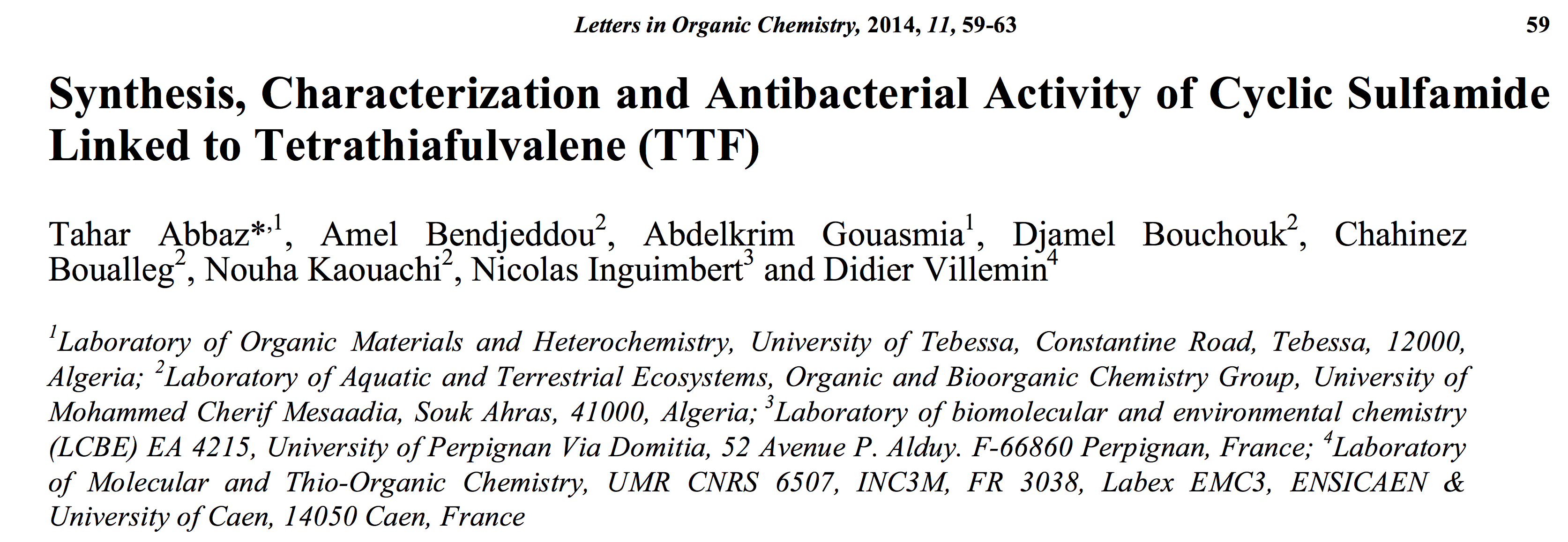
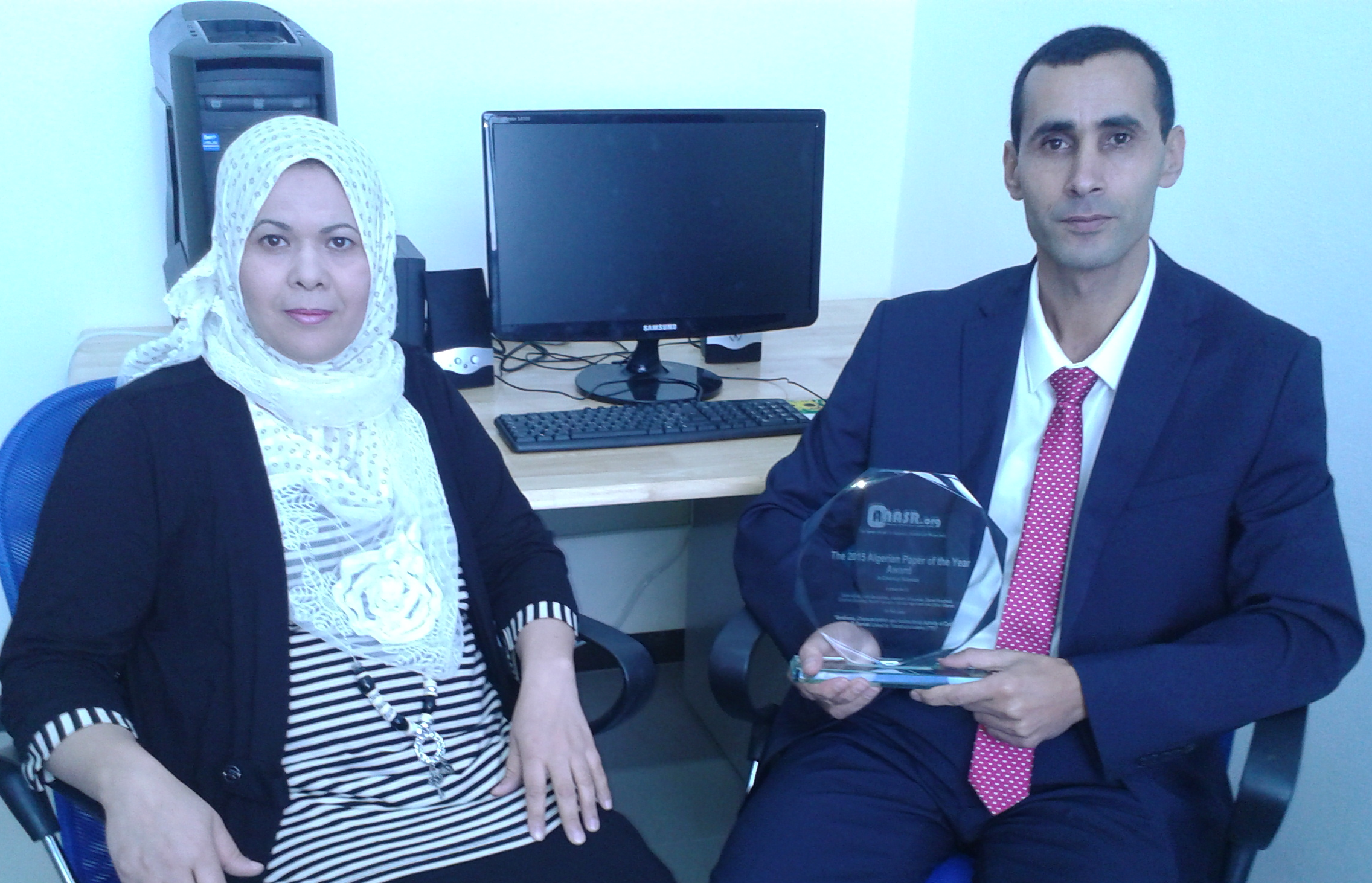
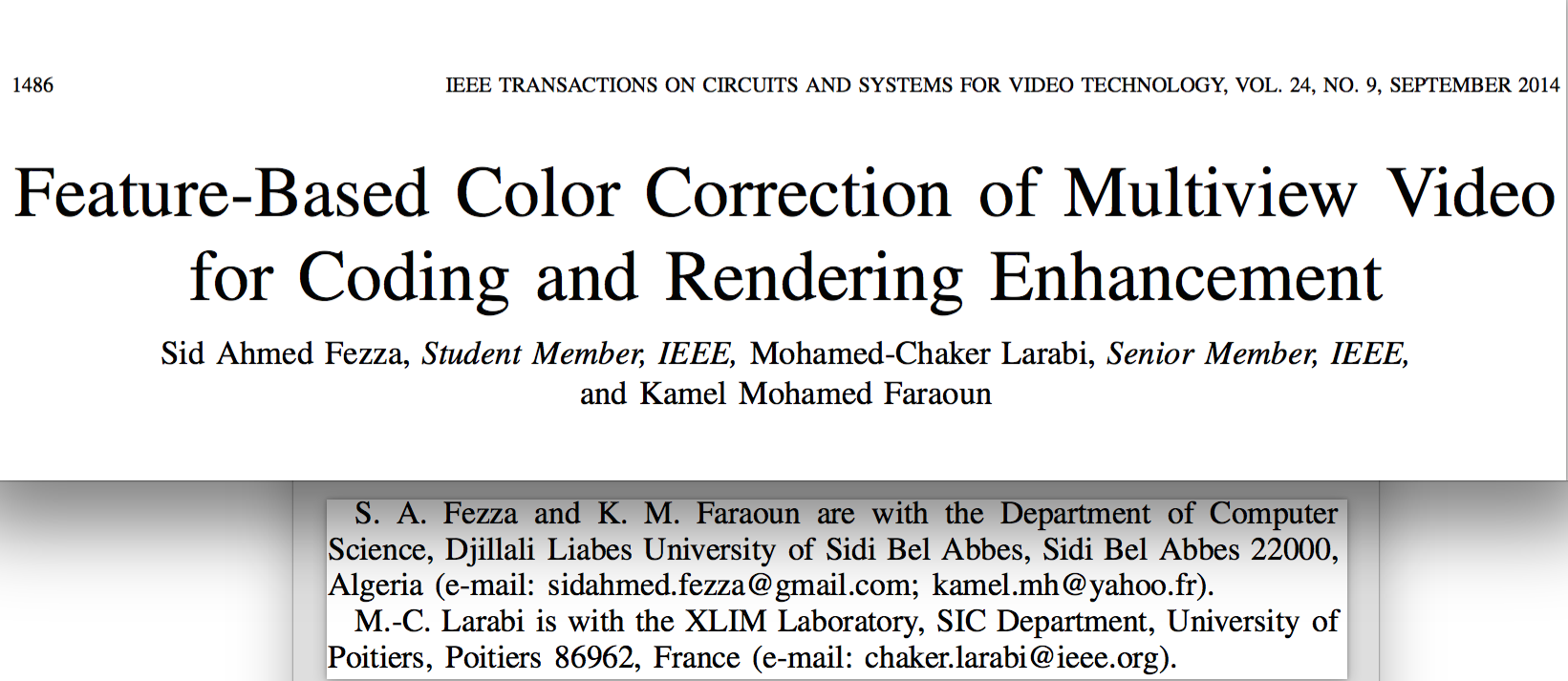
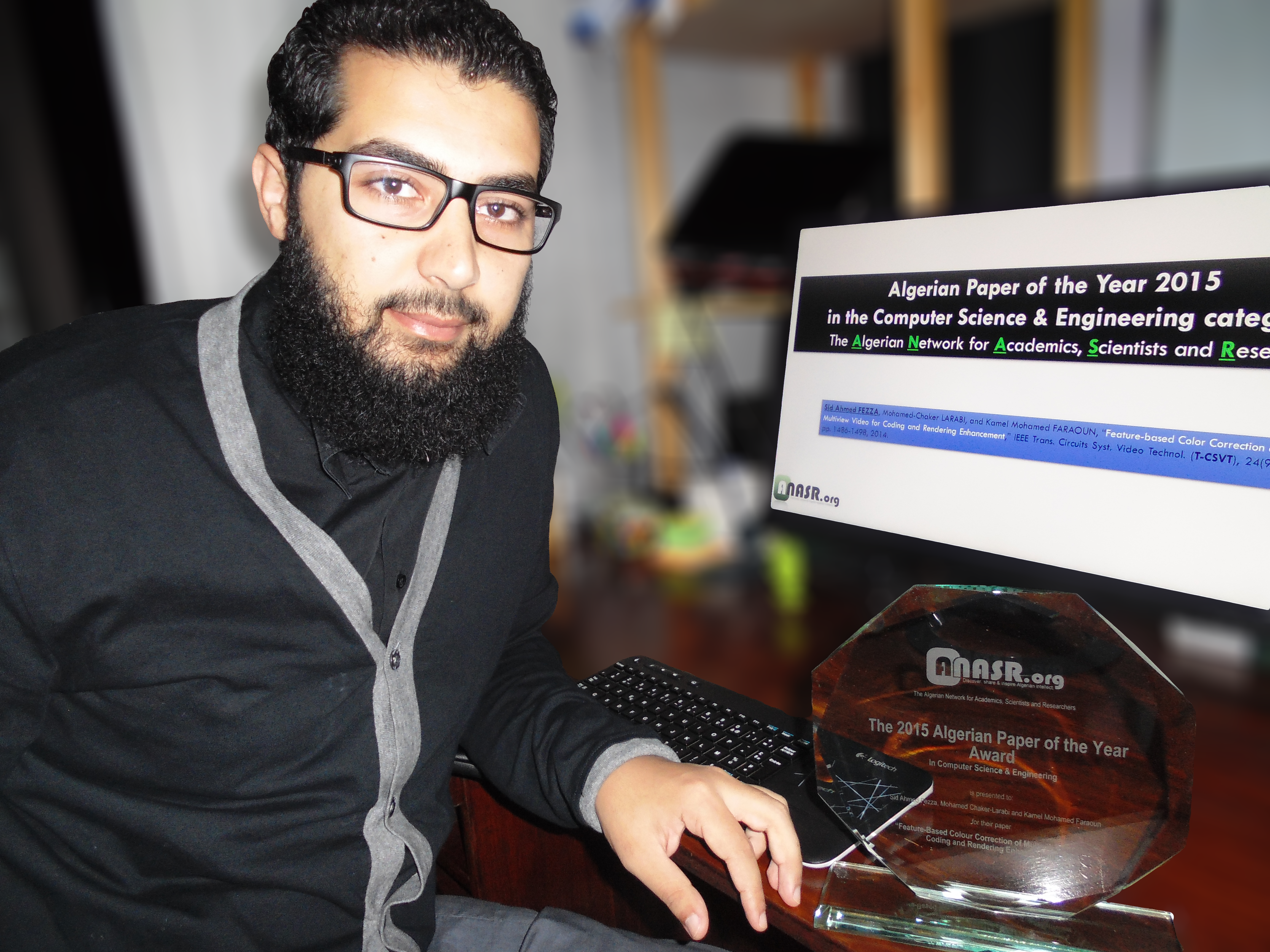
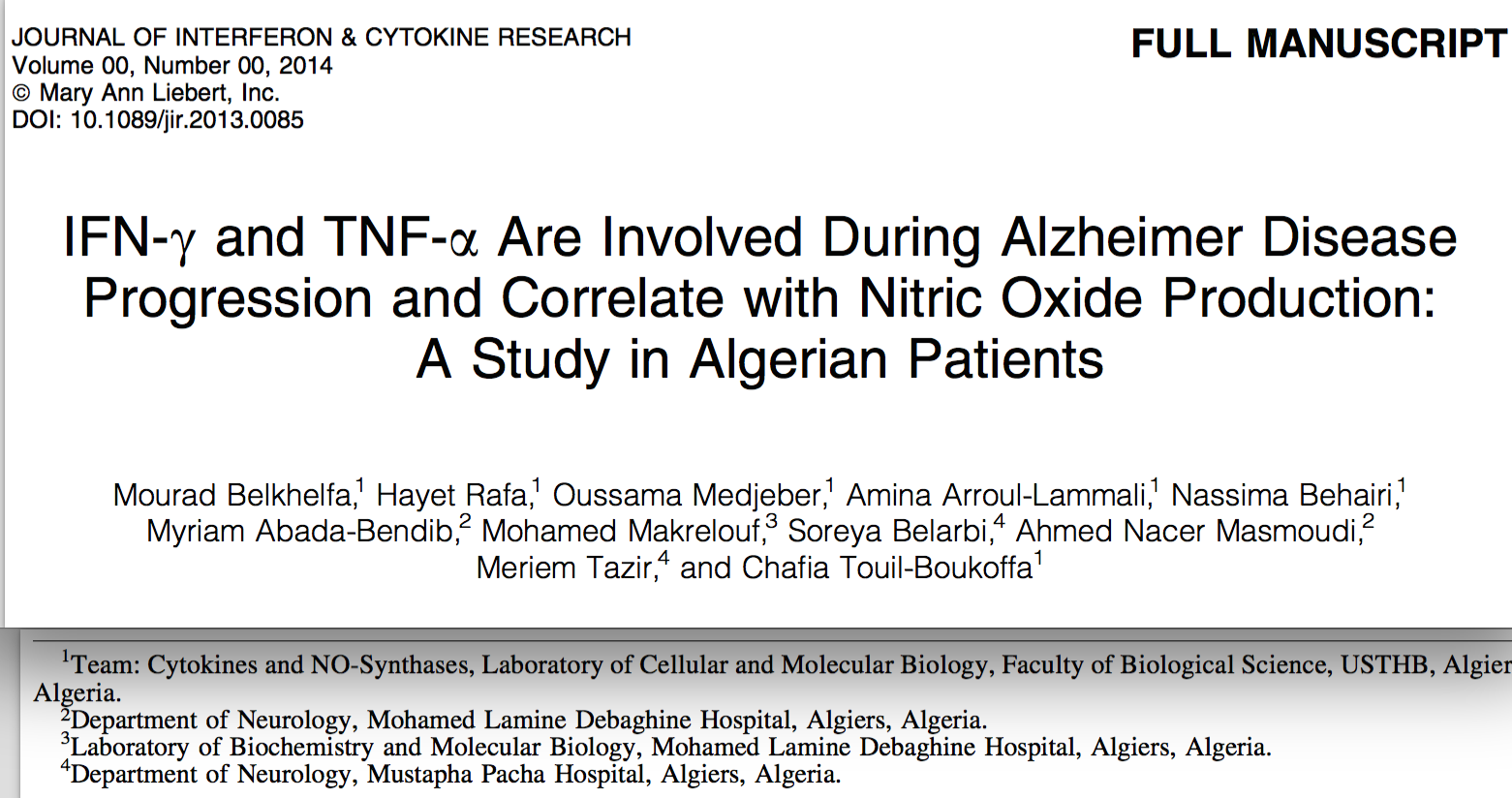
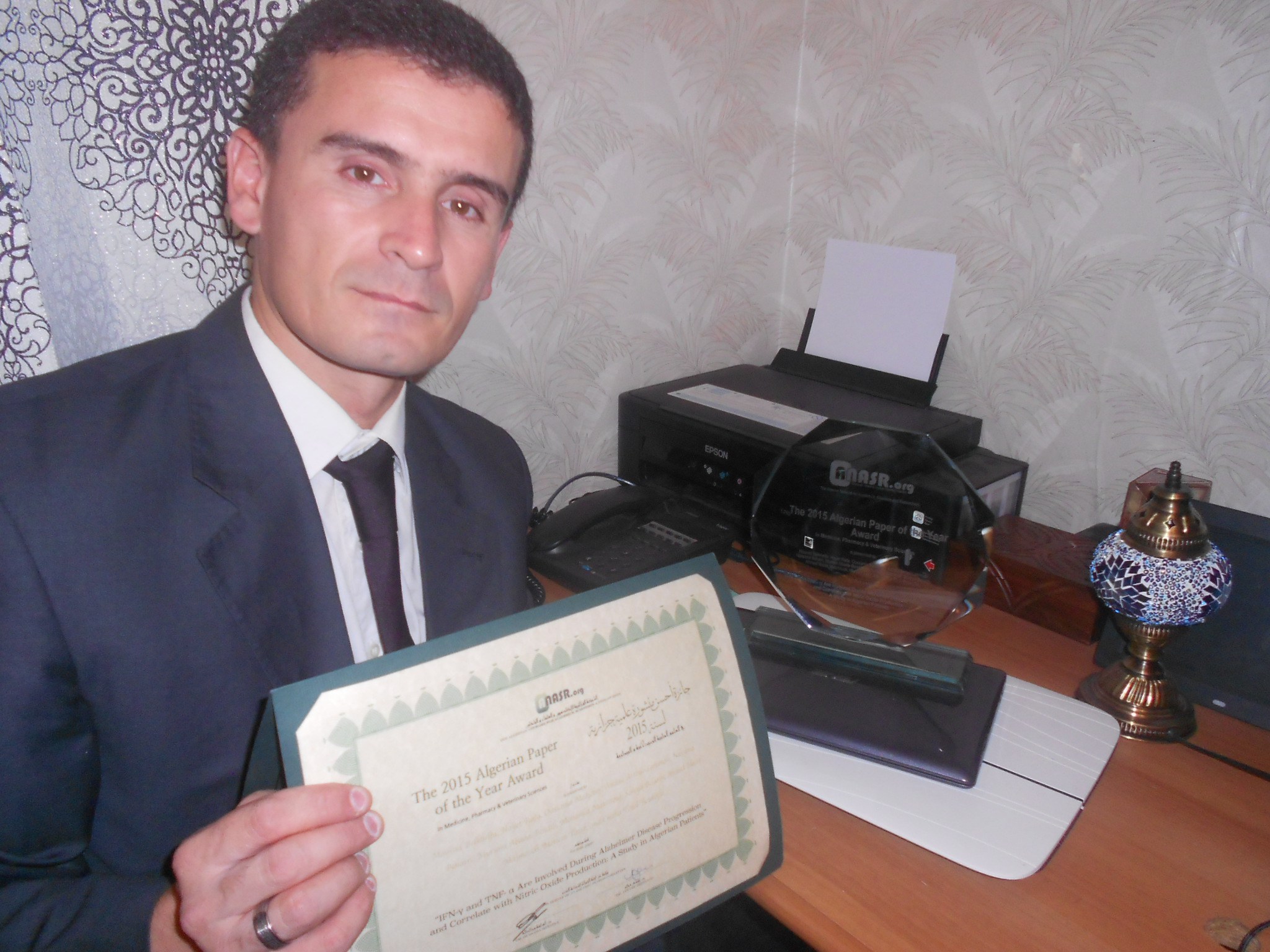
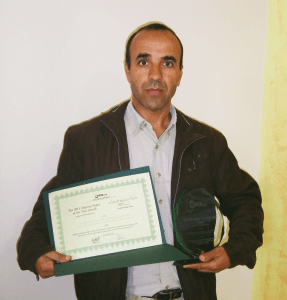
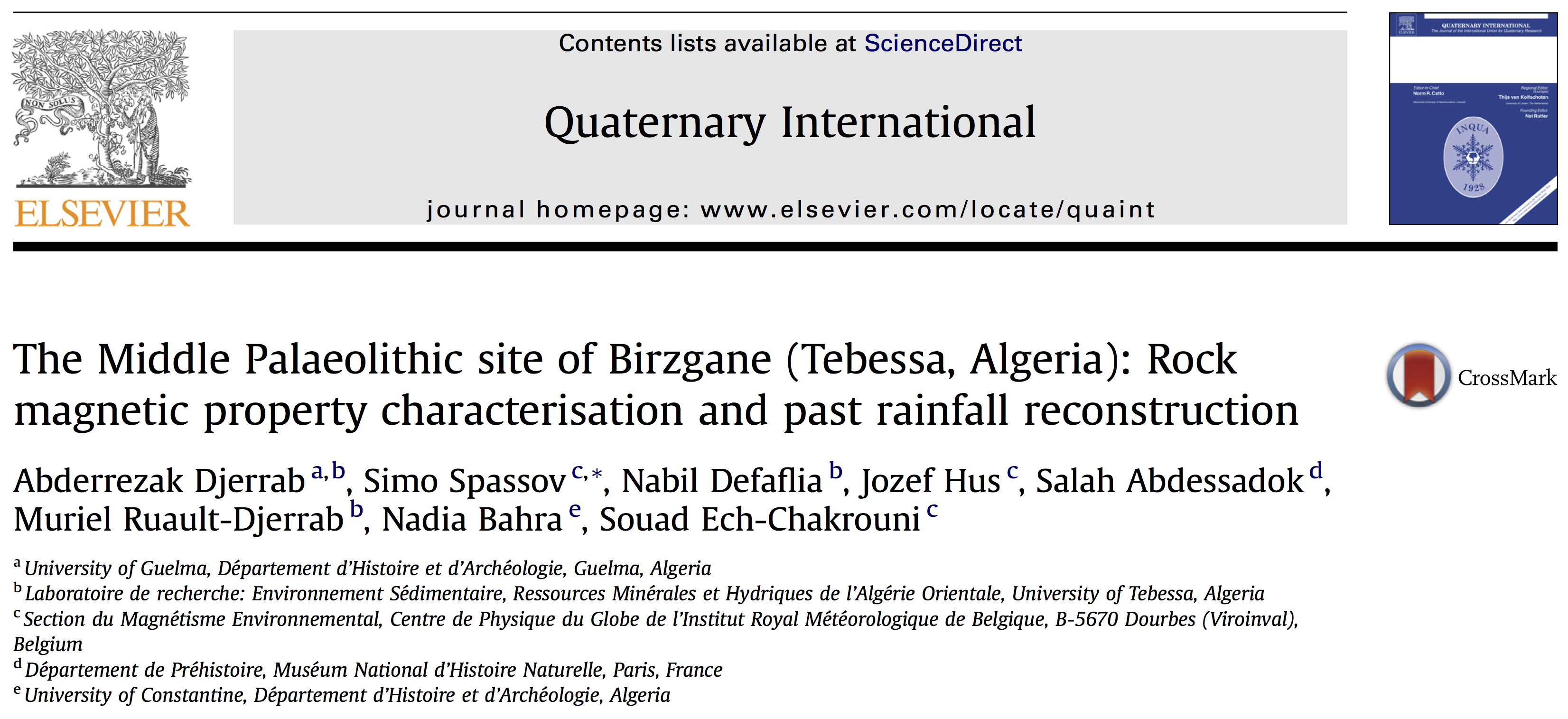
About the Author